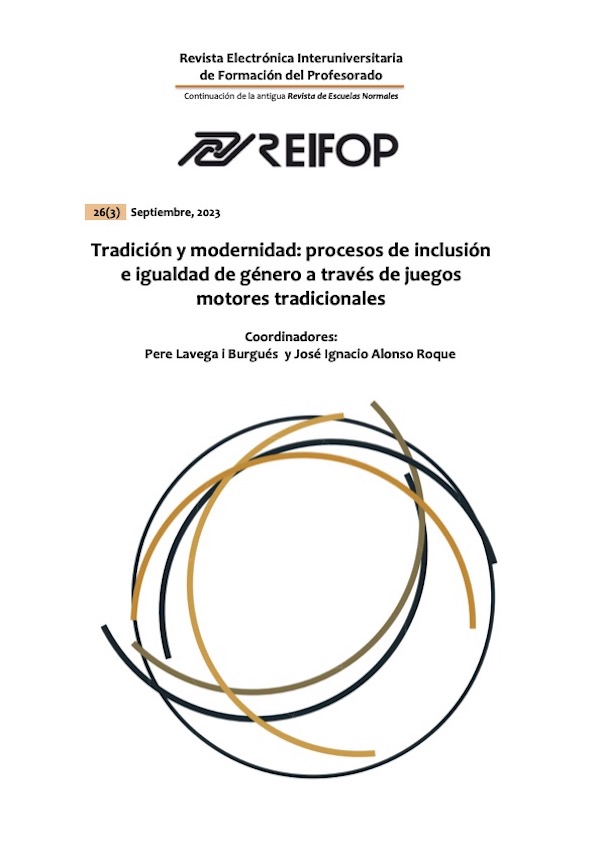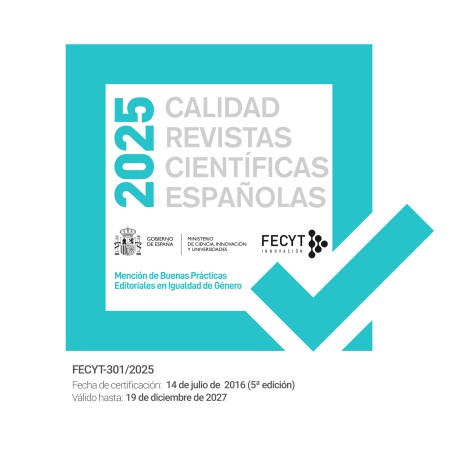Análisis del impacto de un curso formación sobre educación inclusiva en las actitudes y la autoeficacia de futuros docentes
Agencias de apoyo
- Ministerio de Educación (Gobierno de España)
- Universitat de València
Resumen
Las actitudes y la autoeficacia docente son dos constructos relevantes para alcanzar las metas que se propone la escuela inclusiva. La formación resulta ser un factor determinante para mejorar estas dos variables. Por ello, los objetivos de este trabajo fueron examinar las actitudes y la autoeficacia hacia la educación inclusiva de una muestra de futuros maestros antes y después de haber cursado una asignatura sobre necesidades educativas especiales; e identificar factores ajenos a la propia formación universitaria que suponen un aporte a la preparación de los futuros docentes en el ámbito de la inclusión. Un total de 118 futuros maestros cumplimentaron el Teacher Efficacy for Inclusive Practice Scale y el Questionnaire to Measure Attitudes Towards Inclusive Education. Los resultados muestran que el hecho de cursar la asignatura universitaria no causó apenas cambios en las actitudes hacia la inclusión de los estudiantes (que fueron positivas tanto antes como después de esta formación). Por el contrario, tras cursar la asignatura sí se produjo una mejora significativa en la autoeficacia de los participantes. Estos resultados son positivos, pues ambos constructos puntuaron alto en la segunda fase y son clave para instaurar la escuela inclusiva.
Descargas
-
Resumen1689
-
PDF1145
Citas
Abellán, J., Sáez Gallego, N., Reina, R., Ferriz, R., & Navarro Patón, R. (2019). Percepción de autoeficacia hacia la inclusión en futuros maestros de educación física. Revista de Psicología del Deporte/Journal of Sport Psychology, 28(1). 143–156. http://hdl.handle.net/10347/21214
AlMahdi, O., & Bukamal, H. (2019). Pre-service teachers’ attitudes toward inclusive education during their studies in Bahrain Teachers College. SAGE Open, 9(3). https://doi.org/10.1177/2158244019865772
Alnahdi, G. H., & Schwab, S. (2021). Inclusive education in Saudi Arabia and Germany: Students’ perception of school well-being, social inclusion, and academic self-concept. European Journal of Special Needs Education, 36(5), 773-786. https://doi.org/10.1080/08856257.2020.1823163
Alsarawi, A., & Sukonthaman, R. (2021). Preservice Teachers’ Attitudes, Knowledge, and Self-Efficacy of Inclusive Teaching Practices. International Journal of Disability, Development and Education, 1-17. https://doi.org/10.1080/1034912X.2021.1922992
Álvarez-Castillo, J. L., & Buenestado-Fernández, M. (2015). Predictores de las actitudes hacia la inclusión de alumnado con necesidades educativas especiales en futuros profesionales de la educación. Revista Complutense de Educación, 26(3), 627-645. https://doi.org/10.5209/rev_RCED.2015.v26.n3.44551
Ahsan, M. T., Deppeler, J. M., & Sharma, U. (2013). Predicting pre-service teachers’ preparedness for inclusive education: Bangladeshi pre-service teachers’ attitudes and perceived teaching-efficacy for inclusive education. Cambridge Journal of Education, 43(4), 517-535. https://doi.org/10.1080/0305764X.2013.834036
Avramidis, E., Bayliss, P., & Burden, R. (2000). A survey into mainstream teachers' attitudes towards the inclusion of children with special educational needs in the ordinary school in one local education authority. Educational psychology, 20(2), 191-211. https://doi.org/10.1080/713663717
Avramidis, E., & Norwich, B. (2002). Teachers' attitudes towards integration/inclusion: a review of the literature. European journal of special needs education, 17(2), 129-147. https://doi.org/10.1080/08856250210129056
Avramidis, E., & Kalyva, E. (2007). The influence of teaching experience and professional development on Greek teachers’ attitudes towards inclusion. European journal of special needs education, 22(4), 367-389. https://doi.org/10.1080/08856250701649989
Booth, T., & Ainscow, M. (2011). Index for Inclusion: developing learning and participation in schools; (3rd edition). Bristol: Centre for Studies in Inclusive Education (CSIE).
Buli-Holmberg, J., Sigstad, H. M. H., Morken, I., & Hjörne, E. (2022). From the idea of inclusion into practice in the Nordic countries: a qualitative literature review. European Journal of Special Needs Education, 1-16. https://doi.org/10.1080/08856257.2022.2031095
Cardona-Molto, M. C., Ticha, R., & Abery, B. H. (2020). The Spanish Version of the Teacher Efficacy for Inclusive Practice (TEIP) Scale: Adaptation and Psychometric Properties. European Journal of Educational Research, 9(2), 809-823. https://doi.org/10.12973/eu-jer.9.2.809
De Boer, A., Timmerman, M., Pijl, S. J., & Minnaert, A. (2012). The psychometric evaluation of a questionnaire to measure attitudes towards inclusive education. European Journal of Psychology of Education, 27(4), 573-589. https://doi.org/10.1007/s10212-011-0096-z
Donnelly, V., & Watkins, A. (2011). Teacher education for inclusion in Europe. Prospects, 41(3), 341-353. https://doi.org/10.1007/s11125-011-9199-1
Echeita, G., & Duk Homad, C. (2008). Inclusión educativa. REICE. Revista electrónica Iberoamericana sobre calidad, eficacia y cambio en educación. https://repositorio.uam.es/bitstream/handle/10486/661079/REICE_6_2_1.pdf?se
Engelbrecht, P. (2013). Teacher education for inclusion, international perspectives. European Journal of Special Needs Education, 28(2), 115-118. https://doi.org/10.1080/08856257.2013.778110
Forlin, C., Loreman, T., Sharma, U., & Earle, C. (2009). Demographic differences in changing pre‐service teachers’ attitudes, sentiments and concerns about inclusive education. International Journal of Inclusive Education, 13(2), 195-209. https://doi.org/10.1080/13603110701365356
Forlin, C., & Chambers, D. (2011). Teacher preparation for inclusive education: Increasing knowledge but raising concerns. Asia-Pacific Journal of Teacher Education, 39(1), 17-32. https://doi.org/10.1080/1359866X.2010.540850
García-Barrera, A. (2017). Las necesidades educativas especiales: un lastre conceptual para la inclusión educativa en España. Avaliação e Políticas Públicas em Educação, 25(96), 721-742. https://doi.org/10.1590/S0104-40362017002500809
Gigante, J. & Gilmore, L. (2020). Australian preservice teachers’ attitudes and perceived efficacy for teaching in inclusive classrooms. International Journal of Inclusive Education, 24(14), 1568-1577. https://doi.org/10.1080/13603116.2018.1545875
Goddard, C., & Evans, D. (2018). Primary pre-service teachers' attitudes towards inclusion across the training years. Australian Journal of Teacher Education, 43(6), 122-142. http://dx.doi.org/10.14221/ajte.2018v43n6.8
Kunz, A., Luder, R., & Kassis, W. (2021). Beliefs and Attitudes Toward Inclusion of Student Teachers and Their Contact With People With Disabilities. Frontiers in Education, 6. https://doi.org/10.3389/feduc.2021.650236
Lacruz-Pérez, I.; Sanz-Cervera, P.; Tárraga-Mínguez, R. (2021). Teachers’ Attitudes toward Educational Inclusion in Spain: A Systematic Review. Education Sciences, 11(2), 58. https://doi.org/10.3390/educsci11020058
Lautenbach, F., Korte, J., Möhwald, A., Heyder, A., & Grimminger-Seidensticker, E. (2020). A 14-week intervention study on changing preservice teachers’ psychological perspectives on inclusion: Explicit and implicit attitudes, self-efficacy, and stress perception toward inclusion. Frontiers in Education, 5. 7. https://doi.org/10.3389/feduc.2020.00007
Lancaster, J. & Bain, A. (2010). The design of pre-service inclusive education courses and their effects on self-efficacy: a comparative study. Asia-Pacific Journal of Teacher Education, 38(2), 117-128. https://doi.org/10.1080/13598661003678950
Leyser, Y., Zeiger, T., & Romi, S. (2011). Changes in self-efficacy of prospective special and general education teachers: Implication for inclusive education. International Journal of Disability, Development and Education, 58(3), 241–255. https://doi.org/10.1080/1034912X.2011.598397
Li, K. & Cheung, R. (2021) Pre-service Teachers’ Self-efficacy in Implementing Inclusive Education in Hong Kong: The Roles of Attitudes, Sentiments, and Concerns. International Journal of Disability, Development and Education, 68(2), 259-269. https://doi.org/10.1080/1034912X.2019.1678743
Lüke, T., & Grosche, M. (2018). What do I think about inclusive education? It depends on who is asking. Experimental evidence for a social desirability bias in attitudes towards inclusion. International Journal of Inclusive Education, 22(1), 38-53. https://doi.org/10.1080/13603116.2017.1348548
Mosia, P. A. (2014). Threats to inclusive education in Lesotho: An overview of policy and implementation challenges. Africa Education Review, 11(3), 292-310. https://doi.org/10.1080/18146627.2014.934989
Schwab, S. (2019). Teachers’ student-specific self-efficacy in relation to teacher and student variables. Educational Psychology, 39(1), 4-18. https://doi.org/10.1080/01443410.2018.1516861
Sharma, U., Loreman, T., & Forlin, C. (2012). Measuring teacher efficacy to implement inclusive practices. Journal of research in special educational needs, 12(1), 12-21. https://doi.org/10.1111/j.1471-3802.2011.01200.x
Sharma, U., Simi, J., & Forlin, C. (2015). Preparedness of Pre-service teachers for inclusive education in the Solomon Islands. Australian Journal of Teacher Education, 40(5), 103–116. https://search.informit.org/doi/10.3316/informit.204761851572091
Sharma, U., Sokal, L., Wang, M. & Loreman, T. (2021). Measuring the use of inclusive practices among pre-service educators: A multi-national study. Teaching and Teacher Education, 107. 103506. https://doi.org/10.1016/j.tate.2021.103506
Song, J., Sharma, U., & Choi, H. (2019). Impact of teacher education on pre-service regular school teachers' attitudes, intentions, concerns and self-efficacy about inclusive education in South Korea. Teaching and Teacher Education, 86. 102901. https://doi.org/10.1016/j.tate.2019.102901
Torres, J. A., & Fernández, J. M. (2015). Promoviendo escuelas inclusivas: análisis de las percepciones y necesidades del profesorado desde una perspectiva organizativa, curricular y de desarrollo profesional. Revista Electrónica Interuniversitaria de Formación del Profesorado, 18(1), 177–200. https://doi.org/10.6018/reifop.18.1.214391
Triviño-Amigon, N., Barrios-Fernandez, S., Mañanas-Iglesias, C., Carlos-Vivas, J., Mendoza-Muñoz, M., Carmelo-Adsuar, J., Acevedo-Duque, A. & Rojo-Ramos, J. (2022). Spanish Teachers’ Perceptions of Their Preparation for Inclusive Education: The Relationship between Age and Years of Teaching Experience. International Journal of Environmental Research and Public Health, 19(9), 5750. https://doi.org/10.3390/ijerph19095750
UNESCO. (1994). Conferencia Mundial sobre Necesidades Educativas Especiales: Acceso y Calidad. Salamanca: España. https://unesdoc.unesco.org/ark:/48223/pf0000110753_spa
Werner, S., Gumpel, T. P., Koller, J., Wiesenthal, V., & Weintraub, N. (2021). Can self-efficacy mediate between knowledge of policy, school support and teacher attitudes towards inclusive education?. PloS one, 16(9), e0257657. https://doi.org/10.1371/journal.pone.0257657
Los artículos que se publican en esta revista están sujetos a los siguientes términos:
1. El Departamento de Métodos de Investigación y Diagnóstico en Educación de la Universidad de Murcia (España), junto con el Servicio de Publicaciones de la Universitdad de Murcia (Editum) son los editores de la revista REIFOP y conserva los derechos patrimoniales (copyright) de los artículos publicados, permitiendo la reutilización de las mismos bajo la licencia de uso indicada en el punto 2.
2. Las obras se publican en la edición electrónica de la revista bajo una licencia Creative Commons Reconocimiento-NoComercial-SinObraDerivada 3.0 España (texto legal). Se pueden copiar, usar, difundir, transmitir y exponer públicamente, siempre que: i) se cite la autoría y la fuente original de su publicación (revista, editores y URL de la obra); ii) no se usen para fines comerciales; iii) se mencione la existencia y especificaciones de esta licencia de uso.
3. Condiciones de auto-archivo. Se permite y se anima a los autores a difundir electrónicamente las versiones pre-print (versión antes de ser evaluada) y/o post-print (versión evaluada y aceptada para su publicación) de sus obras antes de su publicación, ya que favorece su circulación y difusión más temprana y con ello un posible aumento en su citación y alcance entre la comunidad académica. Color RoMEO: verde.
















